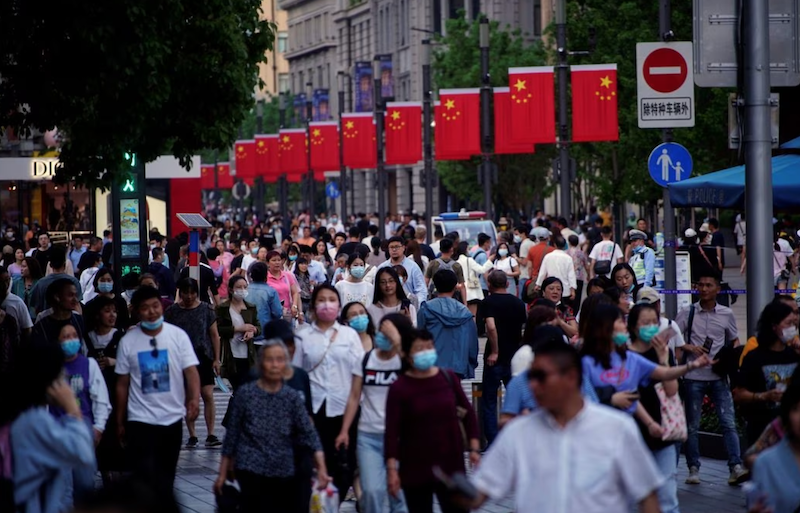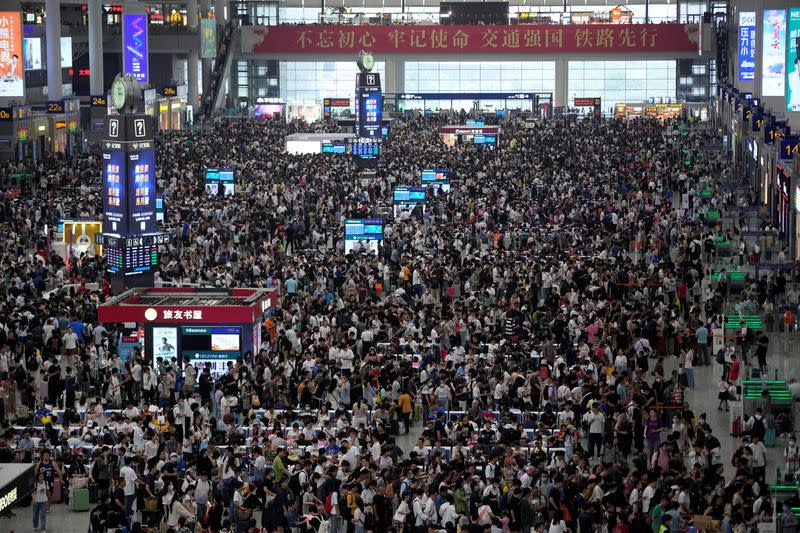Chinese leaders have talked for years of changing the country’s Mao-era residency system, but even with top-level agreement that reform is long overdue progress remains pitifully slow.
Officials in many cities are reluctant to offer citizens from rural areas an urban hukou, or residency permit, fearful of the economic costs they could face.
An urban hukou is a much coveted document. For Yang Guang, 45, it enabled his rise from a village farmer to an Audi-driving businessman with two properties.
Yang, who lives in the central city of Zhengzhou likens the permit – which typically ties a person’s access to health, education, loans and other services to their birthplace – to a “cattle ear-tag the state clipped us with”.
“It uses this tag to sort us into different categories of people entitled to different sets of privileges and subjected to different obligations,” he said.
ALSO SEE: Electric Vehicles Speeding up The Demise of the Oil Era: IEA
When Zhengzhou in the early 2000s temporarily allowed those who bought an apartment to also qualify for a city hukou, Yang seized the opportunity, allowing him to register a business and open stores across Henan province’s capital, transforming his fortunes.
In recent months, Chinese authorities have fanned hopes among some economists that the internal passport system that has largely tethered people’s destinies to their place of origin since the 1950s may be in its dying days. A debt-ravaged property market and sluggish consumption have injected new urgency into a drive to loosen restrictions and grant more people the opportunities that urban registration affords.
The Ministry of Public Security called in August for cities with up to 3 million people to abolish the hukou, and those with 3-5 million citizens to significantly relax issuance. Zhejiang and Jiangsu provinces have announced plans for an almost complete opening to new residents.
But two people involved in hukou policy discussions within the central government have said that progress is stalling, making further significant breakthroughs unlikely, especially in China’s larger cities.
Indebted cities fear added costs
The accounts described previously unreported tensions over hukou reform, with Chinese officials acknowledging a strong economic rationale for change but hesitant to take decisive moves that might disrupt social stability and burden indebted cities with added costs.
“Hukou reform is a hard bone to chew,” said Jia Kang, founding president of the China Academy of New Supply-Side Economics, who advises the government on policies including hukou.
“It should be a natural process, it’s not something you can do simply because you want to. Currently, all reforms are difficult.”
Jia said that while neither the central government nor local governments oppose further hukou easing, implementation depends on cities having the funds and public service capacity.
China’s Ministry of Public Security and the National Development and Reform Commission, the top planning agency, did not respond to requests for comment.
Advisers said China’s largest cities have limited residential supply and face pollution and congestion, affecting their ability to absorb more people. Medium-sized and smaller cities have excess housing stock they would gladly offer to new residents, but due to surging debt they lack the funds to expand access to health facilities, elderly care and education.
“The quality of our urbanisation is poor,” said the second government adviser, who spoke on the condition of anonymity due to the topic’s sensitivity.
Most Chinese cities grew dramatically over the past four decades as the country opened up to entrepreneurship and invested in transport infrastructure and residential projects. But the world’s second-largest economy still lags the 80-90% urbanisation rate in the developed world.

65% live in cities, but only 48% have a city permit
About 65% of China’s 1.4 billion people live in urban areas, compared with 55% in 2013. But only 48% of the population have a city hukou, official data show. That gap has remained steady throughout the period.
While Beijing is working to address strains in local finances, another set of reforms to encourage more people to settle in cities is not in the pipeline, the advisers said.
In China, rural hukou come with land rights – and, implicitly, the insurance policy of living off the farm if city jobs are unavailable – making many migrant workers from the countryside reluctant to apply for urban permits, especially in a slowing economy.
Local governments can lease land for farming, as well as residential, commercial and industrial development, but there is no private land ownership in China and land rights cannot be traded freely.
“We must push forward land system reform. We have plenty of land, which has been wasted,” the second adviser said, adding however that China’s leaders are unwilling to go down that path.
Shao Xiaogai, a 39-year-old store manager in Zhengzhou, prefers to stay registered in her village in the central Henan province. She had tried to get an urban hukou to make it easier to enrol her son in a public school, but a spot opened up for him eventually anyway.
“I tell my son to study hard because we are outsiders in this city,” said Shao. “If he doesn’t do well here, his dad and I will become his burden if we stay in the city. In the village, we can grow whatever food we need.”
Jia said these hurdles mean further hukou liberalisation will be on a city-by-city basis. The second adviser said the pace of urbanisation will slow in coming years, making rural revitalisation more of a priority for China’s leaders.
Rural migrants forced to save more
The hukou dates back to the famines of last century, when Mao Zedong tied food rations to people’s birthplaces to prevent starving peasants from flocking to better-fed cities.
In their modern iteration, hukou limit access to public services for many of the almost 300 million rural migrants who leave their families behind to assemble the smartphones, raise the skyscrapers, lay the roads and clean the malls in Chinese cities.
Migrants get smaller reimbursements for medical expenses than those with urban registration and cannot take their employer’s contributions to retirement savings – two-thirds of the pot – with them when they return home.
As a result, they save more of their income, keeping household consumption – which China wants to make a more prominent driver of economic growth – subdued.
Cai Fang, a central bank adviser, estimates migrant workers typically spend 23% less than those with urban hukou, potentially depriving the economy of more than 2 trillion yuan ($281 billion) – or 1.7% of last year’s GDP – in domestic consumption annually.
There’s also the imperative of boosting demand for apartments, of which China has too many. The property market, which accounts for roughly a quarter of the economy, has been rattled by private developer defaults.
The market would “substantially improve if migrants could be treated more equally” through improved access to better jobs and benefits and enabling them to buy apartments, said Martin Whyte, professor emeritus of international studies and sociology at Harvard University.
Mega cities unlikely to open up
An uncontrolled influx of migrants into the cities, however, may present risks for China’s leaders.
In 2017, after a fire broke out in migrant workers’ living quarters, Beijing authorities launched a campaign to expel people without capital-city hukou, sparking a rare open backlash against the government.
Mega-cities such as Beijing, Shanghai, Shenzhen and Guangzhou have “no chance” of opening up in coming years due to “considerations of social stability and harmony”, said Jia.
“Beijing tried to drive out ‘low-end population’ at one point, which created chaos,” he said, referencing the term that officials in the capital used at the time.
In Zhengzhou, Yang, the businessman, recalled how life was different before he obtained a city hukou. He made a living operating an unlicensed mini-mart in a district of rural migrants, often sleeping on a straw mat in a park as he played hide-and-seek with the police.
“They would organise big teams of volunteers and officers to knock on doors at night to flush out people without hukou,” Yang said. Zhengzhou’s government did not respond to queries.
Once he had the permit, Yang’s prospects soared. In addition to expanding his business, he bought a second home – something only city hukou holders could have – and his first car, a locally made Changan 50 minivan. He enjoyed a more active social life.
“Not many people could afford private vehicles at the time. Pretty girls would ask me to drive them around for some fun,” Yang said. “And I did!”
- Reuters with additional editing by Jim Pollard
ALSO SEE:
China Sees Calls for Deep Reform, Others Urge More Spending
Chinese Graduates Quit Cities as Youth Unemployment Soars
China Sees the Dawn of a New Era of Slower Growth
Over 100 Chinese Cities Battling to Repay Their Debts: Rhodium
























